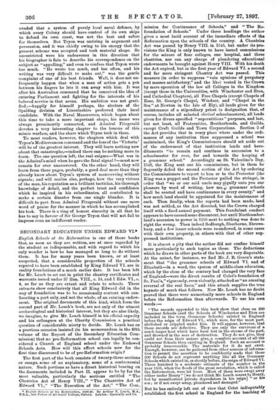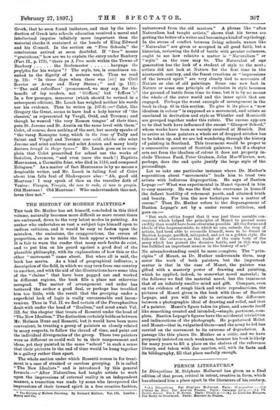SECONDARY EDUCATION UNDER EDWARD VI.*
English Schools at the Reformation is one of those books that, as soon as they are written, are at once regarded by the student as indispensable, and with regard to which his only wonder is how he has managed so long to do without them. It has for many years been known, or at least suspected, that a considerable proportion of the schools reputed to have been established by King Edward VI. are in reality foundations of a much earlier date. It has been left for Mr. Leach to set out in print the chantry certificates and warrants issued under 37 Hen. VIII., c. 14, and 1 Edw. VI., c. 4, so far as they are extant and relate to schools. These extracts show conclusively that all King Edward did in the way of foundation was to be occasionally content with con- fiscating a part only, and not the whole, of an existing endow- ment. The original documents of this kind, which form the second part of Mr. Leach's book, are not only of the utmost archreological and historical interest, but they are also likely, we imagine, to give Mr. Leach himself in his official capacity and his colleagues at the Charity Commission a practical question of considerable nicety to decide. Mr. Leach has on a previous occasion insisted (in his memorandum in the fifth volume of the Report of the Secondary Education Com- mission) that no pre-Reformation school can legally be con- sidered a Church of England school under the Endowed Schools Acts. How will this affect schools now for the first time discovered to be of pre-Reformation origin ?
The first part of the book consists of twenty-three sections or essays, some of an explanatory, some of a controversial nature. Such portions as have a direct historical bearing on the documents included in Part II. appear to be by far the most valuable, particularly the sections entitled " The Ohantries Act of Henry VIII.," "The Chantries Act of Edward VI.," "The Execution of the Act," "The Corn_ • English Schools at the Reformation, 1546.48. By Arthur F. Leach, MA, late Fellow of AU Souls' College, Oxford. London : Constable and Co.
mission for Continuance of Schools," and " The Re- foundation of Schools." Under these headings the author gives a most lucid account of the immediate effects of the Reformation upon the schools of the country. A Chantries Act was passed by Henry VIII. in 1545, but under its pro- visions the King is only known to have issued commissions for the seizure of four colleges, one hospital, and three chantries, nor can any charge of plundering educational endowments be brought against Henry VIII. With his death the Act expired, but in the first year of Edward VI. a second and far more stringent Chantry Act was passed. This measure (in order to suppress "vain opinions of purgatory and masses satisfactory," and the like) vested in the Crown by mere operation of the law all Colleges in the Kingdom (except those in the Universities, with Winchester and Eton, and Cathedral Chapters), all Free Chapels (except Chapels of Ease, St. George's Chapel, Windsor, and "Chapel in the
Sea" at Newton in the Isle of Ely), all lands given for the maintenance of a stipendiary priest (a designation that, of course, includes all salaried clerical schoolmasters), all lands given for divers specified "superstitious " purposes, and last,
but not least, all Fraternities, Brotherhoods, and Guilds, except Craft Guilds and Town Corporations. Section 2 of the Act provides that in every place where under the ordi- nances of any institution thus suppressed a school was maintained, the King's Commissioners should set aside out of the endowment of that institution lands and here- ditaments "to remain and continue in succession to a schoolmaster for ever, for and towards the keeping of a grammar school." Accordingly an St. Valentine's Day, 1548, the King sent out his commissions, but in them he flagrantly defied the second section of the Act by ordering the Commissioners to report to him or to the Protector (the King was a puppet and the Protector pulled the strings), in order that "we or our said uncle may .egnify unto you our pleasure by word of writing, how ma.v grammar schools shall be erected and have continuance in every county," and how much land should be appointed for the maintenance of each. Then finally, when the reports had been made, land was not settled, as the Act directed, but the Crown charged itself with a fixed annual payment. This fraudulent conduct appears to have caused some discontent, but until Northumber- land's accession to power in 1550 next to nothing was done to right the wrong. Then indeed Sedburgh, Sherborne, Shrews- bury, and a few lesser schools were re-endowed, in some cases with their own property, in others with that of other sup- pressed institutions.
It is almost a pity that the author did not confine himself more particularly to such topics as these. The deductions which he draws in other parts of the book are very disputable.
At the outset, for instance, we find Mr. J. R. Green's state- ment that " the grammar schools of Edward VI. and of Elizabeth—in a word, the system of middle-class education, which by the close of the century had changed the very face of England—were the direct results of Colet's foundation of St. Paul's," vigorously, even violently, attacked as " an amazing reversal of the real facts," and this attack supplies the true keynote of much that follows. Now Mr. Leach has no doubt proved that there were numerically more schools in England before the Reformation than afterwards. To use his own words :-
" The records appended to this book show that close on 200 Grammar Schools (and the Schools of Winchester and Eton are included in the term Grammar Schools) existed in England before the reign of Edward VI., which were, for the most part, abolished or crippled under him. It will appear, however, that these records are defective. They are only the survivors of a much larger host which have been lost in the storms of the past, and drowned in the seas of destruction. They do not give, they could not from their nature give, a complete account of all the Grammar Schools then existing in England. Such an account is probably irrecoverable. The materials for it do not exist. Enough, however, can be gathered from other sources of informa- tion to permit the assertion to be confidently made that these 200 Schools do not represent anything like all the Grammar Schools which existed in, or shortly before, the reign of Edward VI. Three hundred is a moderate estimate of the number in the year 1535, when the floods of the great revolution, which is called the Reformation, were let loose. Most of them were swept away either under Henry " [we do not think Mr. Leach means by Henry, but by unauthorised private depredators in his reign] " or his son ; or if not swept away, plundered and damaged."
But he has entirely left out of view that Colet indisputably established the first school in England for the teaching of
Greek, that he soon found imitators, and that by the intro- duction of Greek into schools education received a moral and intellectual impulse infinitely more important than the material checks it sustained at the hands of King Edward and his Council. In the section on " Free Schools," the conclusions arrived at seem doubtful. If " free" means "gratuitous," how are we to explain the entry under Banbury (Part II., p. 173), "there ys A Free stole within the Towne of
Banbury the Scolemaster havynge the profyttes for his waiges " P The style, too, is sometimes un- suited to the dignity of a serious work. Thus we read (p. 13): " In those days when there was [sic] no Civil Service or Army and Navy Stores ; " and (p. 115) : " The said cofeoffees ' (pronounced, we may say, for the benefit of lay readers, not MOffees,' but ' feffees ')." In a few passages, moreover (which should be revised in a subsequent edition). Mr. Leach has weighed neither his words nor his evidence. Thus he writes (p. 107-8) :—" Colet, like Gregory the Great, seems to have had a holy horror of the classics,' as represented by Vergil, Ovid, and Terence ; and though he wanted 'the very Roman tongue' of their time, puts St. Jerome and St. Austin on the same level with them." Colet, of course, does nothing of the sort, but merely speaks of "the varay Romayne tong, which in the time of Tully and Salust and Virgil! and Terence was vsid, whiche also seint Jerome and seint ambrose and seint Austen and many hooly doctors lernyd in theyr times." Mr. Leach goes on to com- plain that Colet prescribed for school use the works of Sedulins, Juvencus, "and even (save the mark ! ) Baptista Mantuanus, a Carmelite friar, who died in 1516, and composed Eclogues." As a matter of fact Mantnanus is by no means a despicable writer, and Mr. Leach in falling foul of Colet about him falls foal of Shakespeare also : " Ah, good old Mantuan ! I may speak of thee as the traveller doth of Venice : Vinegia, Vinegia, chi non to vede, ei non to pregia. Old Mantuan ! Old Mantuan ! Who understandeth thee not, loves thee not."



































 Previous page
Previous page